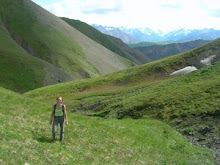All is still well here, just mostly internet-less. And this will be short, because I've been the only customer in this coffeeshop for about an hour and I'm starting to feel awkward. I'm back in orchestra and have a standing gig playing in a group at a nearby university, which is helpful for cash flow and might mean I don't have to get another job right this second. Tabitha is going back to Ohio tomorrow to try and get a drivers license, so she might regain her identity sometime soon. Ummm... It's abruptly become fall, much chillier basically overnight. I love fall, but it is weird to go from tank tops and dresses to sweaters so quickly. But soon the leaves will change, and the chill is better than sticky humidity by a long shot :) And we're moving at the end of the month to our new apartment, which is exciting but tiring to think about. Thank god I won't have to move again for a year.
I'm reading this book that my grandmother sent me called Lord Byron's Novel: The Evening Land by John Crowley. My grandmother is this (as my dad says) politically conservative but socially liberal woman, and she reads like a maniac and then sends all of the books she thinks we'll like. She hits it on the head with me about half the time; she has a penchant for mysteries, which I am just generally not fond of or interested in, but she's also given me some amazing stuff, like Reading Lolita in Tehran and Sherman Alexie's Ten Little Indians. This one has taken me by surprise. The overview story is that Lord Byron, the English romantic poet, wrote one work of prose that was eventually passed on to his estranged daughter Ada (raised by her mother to be her father's opposite, she was a scientist and is credited with writing the first computer program). Some of Ada's papers are rediscovered in London in the present day, and the book basically involves their examination. It's split into essentially three narratives: Byron's novel itself, his daughter Ada's notes on each chapter (which of course reveal a lot about her and her thoughts about her father), and emails between the American historian working in London with the papers, her mathematician girlfriend back in the States, and her estranged father who is a filmmaker and (coincidentally, of course) a former Byron expert whose separation from his daughter seems (also coincidentally) somewhat parallel to Byron and Ada's. Written out, this seems potentially cheesy, but actually I'm quite enthralled by it. The contrast between the Byronic novel sections and the modern emails (the mathematician girlfriend uses no punctuation but thankfully writes the least of the three main emailing characters) is actually quite nice, and the story is compelling enough to keep me going. I'm not done yet, but already I'd recommend it to the interested.
Okay, time to go before I drink more coffee and shake myself to pieces.
Subscribe to:
Post Comments (Atom)







No comments:
Post a Comment